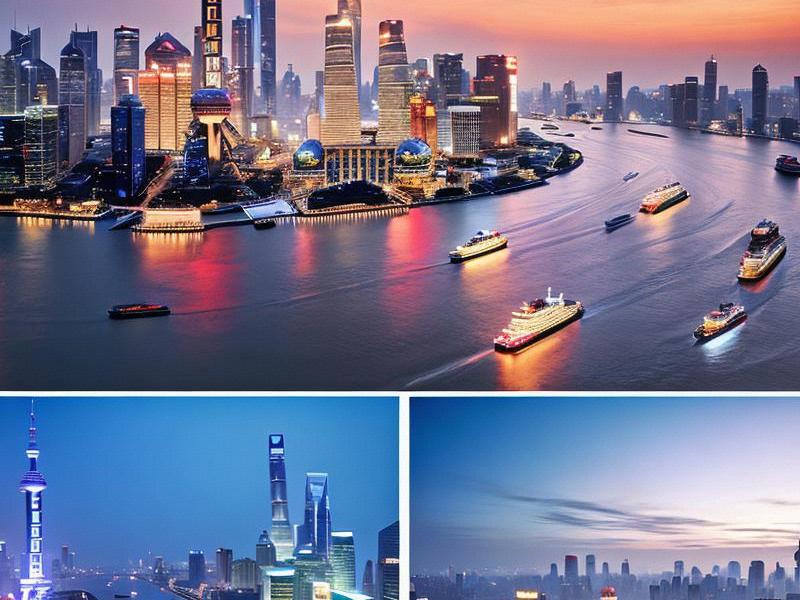This article delves into the multifaceted aspects of Shanghai, exploring its transformation from a historic port city to a global economic powerhouse. It highlights the city's rapid urban development, its status as an economic hub, the rich cultural diversity it embraces, and its increasing global influence.

Shanghai, the largest city in China and one of the world's most dynamic metropolises, has long been a symbol of China's modernization and reform. Situated at the mouth of the Yangtze River, Shanghai serves as a vital gateway between China and the rest of the world. Over the past few decades, the city has undergone remarkable transformations, evolving into a global economic hub, a cultural melting pot, and a beacon of innovation.
The urban development of Shanghai is nothing short of extraordinary. Once a collection of small fishing villages and rice paddies, the city has grown into a sprawling metropolis with towering skyscrapers, modern infrastructure, and efficient public transportation systems. The iconic skyline of Shanghai, dominated by the Oriental Pearl Tower, the Jin Mao Tower, and the Shanghai Tower, is a testament to the city's rapid urbanization and architectural prowess.
The economic hub of Shanghai is another aspect that sets it apart. As one of China's four municipalities directly under the central government, Shanghai enjoys a unique position in the country's economic landscape. The city is home to the Shanghai Stock Exchange, one of the largest stock exchanges in Asia, and the Pudong New Area, a state-level new area that has become a symbol of China's economic reform and opening up. Pudong, with its modern skyscrapers, bustling financial district, and advanced infrastructure, has attracted numerous multinational corporations and financial institutions, making it a global financial center.
Shanghai's economic success is not limited to finance; the city is also a major hub for trade, logistics, and manufacturing. The Port of Shanghai, the world's busiest container port, handles billions of tons of cargo annually, connecting China to markets around the globe. The city's strategic location and well-developed transportation network, including the Shanghai Maglev Train, the world's fastest commercial high-speed train, have made it a key player in global trade and logistics.
上海龙凤419手机
Cultural diversity is another defining feature of Shanghai. Known as the "Paris of the East," the city has a rich history and a unique blend of traditional Chinese culture and Western influences. The Bund, a historic waterfront promenade, showcases the city's colonial architecture and offers stunning views of the futuristic skyline across the Huangpu River. The French Concession, with its charming cobblestone streets, tree-lined boulevards, and historic buildings, is a testament to Shanghai's colonial past and its embrace of Western culture.
Shanghai's cultural scene is vibrant and diverse, with numerous museums, art galleries, theaters, and music venues. The Shanghai Museum, renowned for its extensive collection of Chinese art, attracts millions of visitors each year. The city's art scene is thriving, with galleries and art spaces showcasing contemporary works from both Chinese and international artists. The Shanghai International Film Festival, one of the oldest and most prestigious film festivals in Asia, has become a platform for filmmakers from around the world to showcase their talent.
The city's culinary scene is equally diverse, reflecting its rich cultural heritage and global influences. From traditional Shanghainese cuisine, known for its sweet and savory flavors, to international dishes from around the world, Shanghai offers a wide range of dining options. The city's night markets and food streets are popular destinations for locals and tourists alike, offering a taste of the city's vibrant culinary culture.
爱上海同城对对碰交友论坛
Shanghai's increasing global influence is evident in its role as a major center for international diplomacy, trade, and culture. The city has hosted numerous high-profile international events, including the World Expo in 2010, which attracted millions of visitors from around the world. The Expo not only showcased China's economic achievements but also highlighted Shanghai's ability to host large-scale international events and its commitment to sustainable development.
The city's leadership in innovation and technology is another aspect of its global influence. Shanghai is home to numerous research institutions, universities, and technology parks, fostering a vibrant innovation ecosystem. The Zhangjiang Hi-Tech Park, for example, is a major hub for biotechnology and information technology companies, attracting talent and investment from around the world.
Shanghai's commitment to sustainability and environmental protection is also noteworthy. The city has implemented numerous initiatives to reduce pollution, improve air quality, and promote green development. The construction of the world's first maglev train, which runs on electricity and produces no emissions, is a testament to the city's commitment to sustainable transportation. The city's green spaces, such as the Century Park and the Huangpu River waterfront, provide residents and visitors with opportunities to enjoy nature and relax in a clean and healthy environment.
上海贵族宝贝sh1314
Despite its rapid development, Shanghai remains committed to preserving its rich cultural heritage and historical landmarks. Efforts have been made to protect and restore historic buildings and neighborhoods, ensuring that the city's unique character is preserved for future generations. The conservation of the Yu Garden, a classical Chinese garden built in the Ming Dynasty, and the restoration of the former French Concession are examples of the city's dedication to preserving its cultural heritage.
Shanghai's education system is another area of strength, with numerous prestigious universities and research institutions. Fudan University and Tongji University, two of the country's leading universities, are located in Shanghai and attract students from around the world. The city's emphasis on education and research has contributed to its status as a global center of learning and innovation.
In conclusion, Shanghai is a dynamic metropolis that continues to evolve and thrive on the global stage. Its rapid urban development, economic hub status, cultural diversity, and increasing global influence make it a city of immense significance. As Shanghai looks to the future, it remains committed to sustainable development, innovation, and preserving its rich cultural heritage, ensuring that it remains a beacon of progress and prosperity for generations to come.